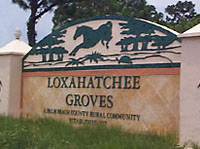Voters in the Town of Loxahatchee Groves resoundingly rejected a referendum question on Tuesday that would have enabled residents to obtain long-term loans to improve their roads and drainage. The vote was 368 (62.80 percent) opposed and 218 (37.20 percent) in favor.
Mayor Dave Browning explained that the referendum question asked voters if they want to change the existing charter language that prohibits the council from taking out long-term loans.
“Nothing changes,” Browning said. “This was a tool to allow people who wanted to pay the extra to have their road paved. It would have allowed them to borrow that money over 10 years rather than three years. Our original charter set up a limit to three years of borrowing. The purpose was so that we would not go into long-term debt like a lot of towns do. We’re still at that three-year limit, which means it will almost make it impossible for someone to have their road paved.”
Browning said that the town had established a policy where Loxahatchee Groves would pay half the cost and the residents who wanted paving would pay the other half.
“To have the residents come up with the other 50 percent in three years is going to be very difficult,” Browning said.
Browning attributed voters’ rejection of the referendum question largely as frustration over taxes.
“A lot of people didn’t understand what the referendum was for,” Browning said. “They really thought that the town would then be able to go out and just borrow willy-nilly. That wasn’t the case, but the voters spoke, so we will just continue to go on. It really doesn’t change anything.”
Browning said that when he was a Loxahatchee Groves Water Control District supervisor, the district was able to get a 10-year loan to pave roads with open-graded emulsified mix (OGEM), but now that it is dependent to the town, the district may have to adhere to the town charter requirements.
“That will be something I will be looking into,” Browning said. “I think there were people who thought that they could incur long-term debt, so we will have to look into that and see if there is any difference, but I don’t believe there is. I think they have to fall under the same three-year criteria.”
Browning added that the district was able to get OGEM paving in order to control dust and stabilize roads, and he doesn’t know if the district will have the ability to build new roads. He noted that B Road was paved with asphalt by the commercial enterprises to the east and west of the road.
“We will continue to stabilize the roads and do whatever we need to do to keep them in good shape, but as far as the paving, I don’t think those issues will proceed,” Browning said. “I think that will come to a halt. I think there was a lot of misunderstanding, and we’re limited when we put a referendum on the ballot. We have to be very careful that we can’t try to promote one way or the other.”
Town Manager Bill Underwood said the referendum question would have allowed residents to get a loan similar to anyone who gets a mortgage or car loan, and its rejection will stymie property owners who have petitioned to have their roads paved.
“The issue is that the funding for roads will not be available,” he said. “It appears that the people have voted that they want dirt roads, and that’s OK. The issue is that residents of North B Road voted, they voted on Los Angeles and San Diego [Drives], they voted on 22nd Road North, Sacramento and Raymond Drive. They voted to get their roads paved, but the majority of the [referendum] voters voted ‘no.’”
Underwood said that he empathizes with the people who wanted to get their roads paved, which accounts for about six miles of roads.
“At this point, it doesn’t look as though that is going to occur,” he said. “Now they will not have the authority to get that done. We had started to do engineering work. We were doing conceptual planning to get the real numbers, but now we’ve stopped that process.”








